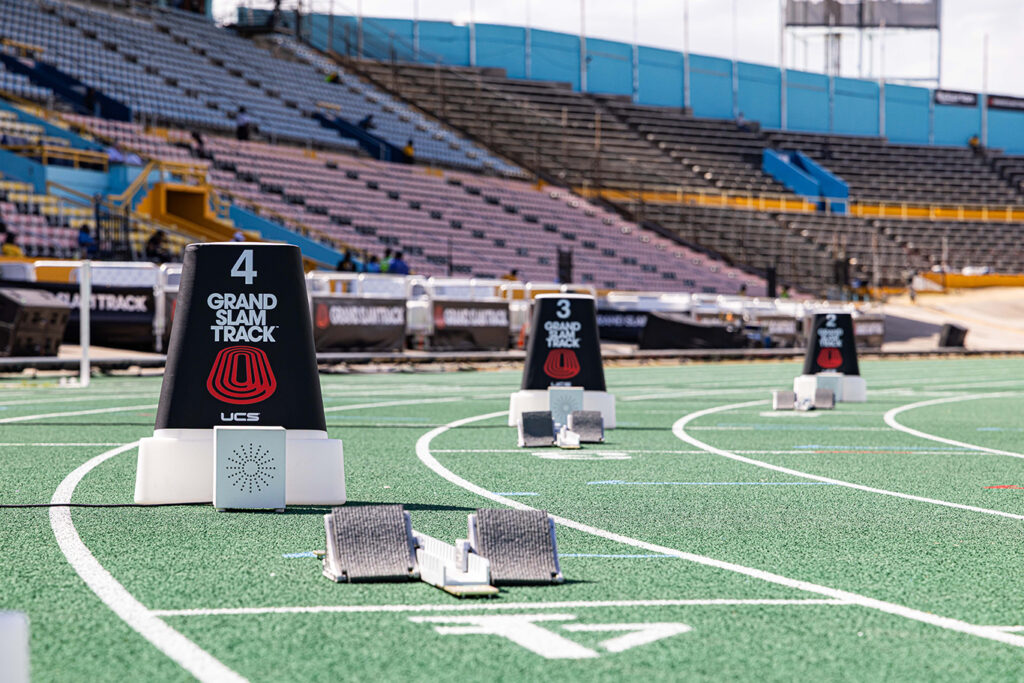Michael Johnson posted an open letter to Grand Slam Track athletes on Friday that addressed months of rumors why the league has been unable to compensate them within a previously agreed time frame.
According to Johnson, there were major issues with investor funding that ultimately led to the cancelation of the final meet in June in Los Angeles along with leading to delays in when athletes would be paid.
“Due to our strong desire to make this right as quickly as possible, we offered dated payment timelines and have been unable to meet them,” Jonhson said in his statement. “Understandably, this has led to frustration, disappointment, and inconvenience to our athletes, agents, and vendors. I know this damages trust. I know this makes some wonder if our vision can survive. That is why we are not just addressing the immediate problem; we are putting systems and partnerships in place to make sure it never happens again.”
Johnson later expressed that the league would focus on paying its outstanding debts and he said he felt “confident” in the future of the league.

Grand Slam Track has navigated a wave of hurdles — and questions — since the league was announced last February.
The addition of Sydney McLaughlin-Levrone as the first signed athlete lent instant credibility to the venture and other big name talents like Gabby Thomas, Josh Kerr, Grant Fisher and Yared Nuguse would later join — while standouts like Noah Lyles and Sha’Carri Richardson were notably absent. But the promise of increased prize payouts of $100,000 for event category winners far out paced other track and field promotions like Diamond League, whose leaders confirmed had little contact with Grans Slam Track.
Johnson had secured $30 million in backing and a partnership with Winners Alliance, while guaranteeing $12.6 million in prize money to athletes
But by the end of 2024, the league had made no formal announcement about national — and international — broadcast deals and a major sponsor like a shoe or apparel brand was noticeably absent.
Still, the league filled all 96 Racer and Challenger athlete slots before its inaugural meet in Kingston, Jamaica in early April and unveiled detailed steaming and broadcast plans.
However, the Kingston meet was dogged by poor attendance and ticket sales and the sparse crowds at the 35,000-seat National Stadium were apparent during the broadcasts. The second meet in May in the Miami area, at the smaller 5,000-person capacity Ansin Sports Complex in Miramar, Florida fared much better as the series shifted to Philadelphia later in the month.
Just weeks later on May 15, the league announced that the Philadelphia meet would be trimmed to two days instead of the scheduled three that were part of the Kingston and Miami schedules. Johnson said the changes were more about the league listening to fan critiques and condensing the dates would help improve the quality of the product. But critics were skeptical and rumors about the stability of Grand Slam Track swirled.
The adjusted Philadelphia meet was held at Penn’s cavernous Franklin Field, was well-attended over both days and reflected the lessons that league official learned from the prior two events in a sign that Grand Slam Track’s formula could work especially with on-the-fly adjustments.
However in the weeks after the Philadelphia meet, the bulk of the 48 Challengers — non contracted competitors — were not announced for Los Angeles even as media received credential approvals. On June 12, the league announced that the Los Angeles meet was canceled with an explanation that suggested there were cash issues.
In July separate reports in The Times and Front Office Sports revealed that the league owed its athletes $13 million in appearance fees and prizes dating back to the Kingston meet.
An email obtained by both outlets revealed that the league explained to athletes and their representatives that there was a plan to begin payments.
“At this time, all agents who have sent the appropriate paperwork have been issued appearance fee payments for Kingston,” the email said. “Our plan is to make payments for Kingston prize money before the end of July and the remaining payments due by the end of September, which includes the honoring of Los Angeles appearance fees.”
Still, some athletes even reached out to World Athletics to talk about the matter as reports of the league not paying vendor and venue rental fees.
On July 24, Johnson posted a video on social media explaining that an investor pulling out of the league caused a “major cash flow” problem — an even clearer sign of the trouble Grand Slam Track faced even before its first meet.
“We’ve had a very difficult situation this year financially,” Johnson said in the video. “We had an investor that wasn’t able to honor their complete commitment to the league. So we started off with the capital we needed to get through the season as we planned it with the four slams — and made sure we could take care of everyone.”
With Friday’s letter, the future of the league remains cloudy even as Johnson indicated that the search for new investors is ongoing and a 2026 season will happen once this season’s athletes are compensated.






